Economics 1: Analysis of Star India Pvt. Ltd. v. Moviestrunk Case
VerifiedAdded on 2021/06/30
|15
|6011
|59
Case Study
AI Summary
This case study examines the economic implications of the landmark Intellectual Property (IP) case, Star India Pvt. Ltd. v. Moviestrunk.com & Ors., focusing on the impact of online film piracy in India. The assignment begins with an introduction to intellectual property rights, the rise of illegal streaming, and the significant financial losses incurred by the entertainment industry due to copyright infringement. It then outlines the research objectives, questions, and hypothesis, along with the limitations of the study and a review of relevant literature. The core of the study is a detailed analysis of the Star India case, including the players involved (Star India, Moviestrunk.com, and various ISPs), the actions taken (legal suit against websites hosting pirated content), and the judgement passed by the Delhi High Court. The study delves into the economic evaluation of the judgement, discussing its implications for the protection of intellectual property rights and suggesting improvements to combat piracy effectively. The case study concludes with suggestions and a bibliography, providing a comprehensive overview of the legal and economic dimensions of film piracy and the importance of safeguarding intellectual property in the digital age.
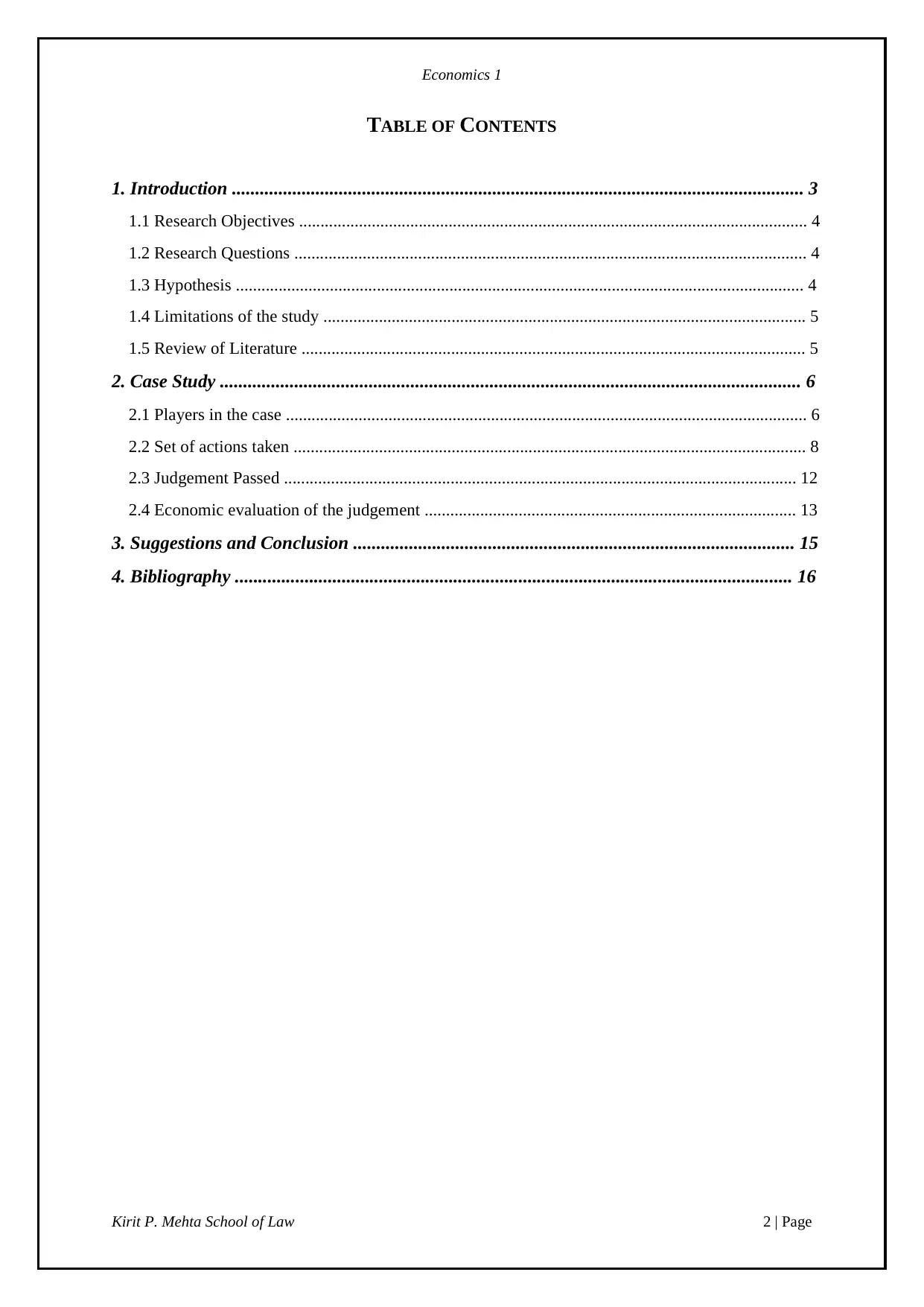
Economics 1
Kirit P. Mehta School of Law 2 | Page
TABLE OF CONTENTS
1. Introduction ........................................................................................................................... 3
1.1 Research Objectives ....................................................................................................................... 4
1.2 Research Questions ........................................................................................................................ 4
1.3 Hypothesis ..................................................................................................................................... 4
1.4 Limitations of the study ................................................................................................................. 5
1.5 Review of Literature ...................................................................................................................... 5
2. Case Study ............................................................................................................................. 6
2.1 Players in the case .......................................................................................................................... 6
2.2 Set of actions taken ........................................................................................................................ 8
2.3 Judgement Passed ........................................................................................................................ 12
2.4 Economic evaluation of the judgement ....................................................................................... 13
3. Suggestions and Conclusion ............................................................................................... 15
4. Bibliography ........................................................................................................................ 16
Kirit P. Mehta School of Law 2 | Page
TABLE OF CONTENTS
1. Introduction ........................................................................................................................... 3
1.1 Research Objectives ....................................................................................................................... 4
1.2 Research Questions ........................................................................................................................ 4
1.3 Hypothesis ..................................................................................................................................... 4
1.4 Limitations of the study ................................................................................................................. 5
1.5 Review of Literature ...................................................................................................................... 5
2. Case Study ............................................................................................................................. 6
2.1 Players in the case .......................................................................................................................... 6
2.2 Set of actions taken ........................................................................................................................ 8
2.3 Judgement Passed ........................................................................................................................ 12
2.4 Economic evaluation of the judgement ....................................................................................... 13
3. Suggestions and Conclusion ............................................................................................... 15
4. Bibliography ........................................................................................................................ 16
Paraphrase This Document
Need a fresh take? Get an instant paraphrase of this document with our AI Paraphraser
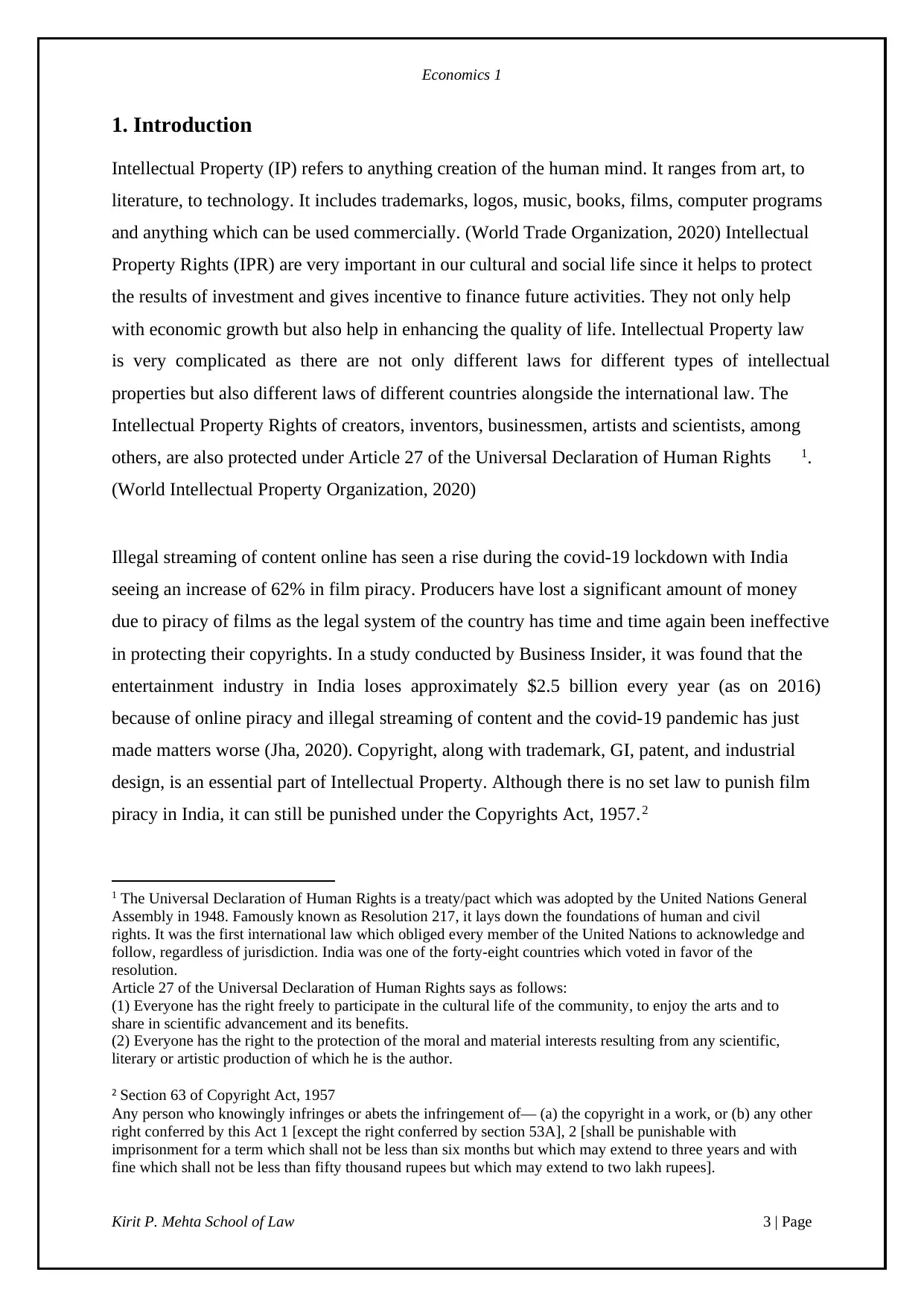
Economics 1
Kirit P. Mehta School of Law 3 | Page
1. Introduction
Intellectual Property (IP) refers to anything creation of the human mind. It ranges from art, to
literature, to technology. It includes trademarks, logos, music, books, films, computer programs
and anything which can be used commercially. (World Trade Organization, 2020) Intellectual
Property Rights (IPR) are very important in our cultural and social life since it helps to protect
the results of investment and gives incentive to finance future activities. They not only help
with economic growth but also help in enhancing the quality of life. Intellectual Property law
is very complicated as there are not only different laws for different types of intellectual
properties but also different laws of different countries alongside the international law. The
Intellectual Property Rights of creators, inventors, businessmen, artists and scientists, among
others, are also protected under Article 27 of the Universal Declaration of Human Rights 1.
(World Intellectual Property Organization, 2020)
Illegal streaming of content online has seen a rise during the covid-19 lockdown with India
seeing an increase of 62% in film piracy. Producers have lost a significant amount of money
due to piracy of films as the legal system of the country has time and time again been ineffective
in protecting their copyrights. In a study conducted by Business Insider, it was found that the
entertainment industry in India loses approximately $2.5 billion every year (as on 2016)
because of online piracy and illegal streaming of content and the covid-19 pandemic has just
made matters worse (Jha, 2020). Copyright, along with trademark, GI, patent, and industrial
design, is an essential part of Intellectual Property. Although there is no set law to punish film
piracy in India, it can still be punished under the Copyrights Act, 1957.2
1 The Universal Declaration of Human Rights is a treaty/pact which was adopted by the United Nations General
Assembly in 1948. Famously known as Resolution 217, it lays down the foundations of human and civil
rights. It was the first international law which obliged every member of the United Nations to acknowledge and
follow, regardless of jurisdiction. India was one of the forty-eight countries which voted in favor of the
resolution.
Article 27 of the Universal Declaration of Human Rights says as follows:
(1) Everyone has the right freely to participate in the cultural life of the community, to enjoy the arts and to
share in scientific advancement and its benefits.
(2) Everyone has the right to the protection of the moral and material interests resulting from any scientific,
literary or artistic production of which he is the author.
2 Section 63 of Copyright Act, 1957
Any person who knowingly infringes or abets the infringement of— (a) the copyright in a work, or (b) any other
right conferred by this Act 1 [except the right conferred by section 53A], 2 [shall be punishable with
imprisonment for a term which shall not be less than six months but which may extend to three years and with
fine which shall not be less than fifty thousand rupees but which may extend to two lakh rupees].
Kirit P. Mehta School of Law 3 | Page
1. Introduction
Intellectual Property (IP) refers to anything creation of the human mind. It ranges from art, to
literature, to technology. It includes trademarks, logos, music, books, films, computer programs
and anything which can be used commercially. (World Trade Organization, 2020) Intellectual
Property Rights (IPR) are very important in our cultural and social life since it helps to protect
the results of investment and gives incentive to finance future activities. They not only help
with economic growth but also help in enhancing the quality of life. Intellectual Property law
is very complicated as there are not only different laws for different types of intellectual
properties but also different laws of different countries alongside the international law. The
Intellectual Property Rights of creators, inventors, businessmen, artists and scientists, among
others, are also protected under Article 27 of the Universal Declaration of Human Rights 1.
(World Intellectual Property Organization, 2020)
Illegal streaming of content online has seen a rise during the covid-19 lockdown with India
seeing an increase of 62% in film piracy. Producers have lost a significant amount of money
due to piracy of films as the legal system of the country has time and time again been ineffective
in protecting their copyrights. In a study conducted by Business Insider, it was found that the
entertainment industry in India loses approximately $2.5 billion every year (as on 2016)
because of online piracy and illegal streaming of content and the covid-19 pandemic has just
made matters worse (Jha, 2020). Copyright, along with trademark, GI, patent, and industrial
design, is an essential part of Intellectual Property. Although there is no set law to punish film
piracy in India, it can still be punished under the Copyrights Act, 1957.2
1 The Universal Declaration of Human Rights is a treaty/pact which was adopted by the United Nations General
Assembly in 1948. Famously known as Resolution 217, it lays down the foundations of human and civil
rights. It was the first international law which obliged every member of the United Nations to acknowledge and
follow, regardless of jurisdiction. India was one of the forty-eight countries which voted in favor of the
resolution.
Article 27 of the Universal Declaration of Human Rights says as follows:
(1) Everyone has the right freely to participate in the cultural life of the community, to enjoy the arts and to
share in scientific advancement and its benefits.
(2) Everyone has the right to the protection of the moral and material interests resulting from any scientific,
literary or artistic production of which he is the author.
2 Section 63 of Copyright Act, 1957
Any person who knowingly infringes or abets the infringement of— (a) the copyright in a work, or (b) any other
right conferred by this Act 1 [except the right conferred by section 53A], 2 [shall be punishable with
imprisonment for a term which shall not be less than six months but which may extend to three years and with
fine which shall not be less than fifty thousand rupees but which may extend to two lakh rupees].
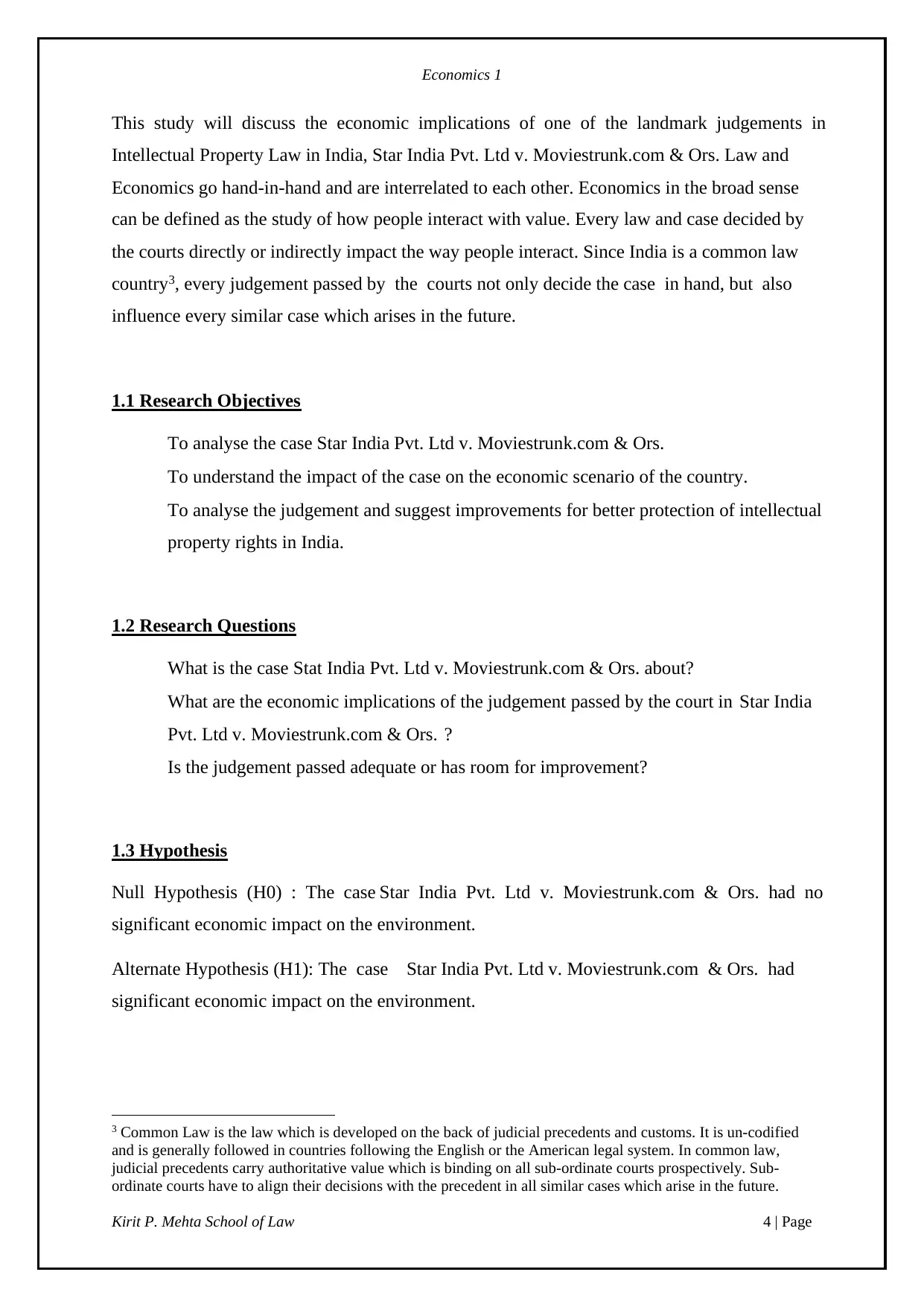
Economics 1
Kirit P. Mehta School of Law 4 | Page
This study will discuss the economic implications of one of the landmark judgements in
Intellectual Property Law in India, Star India Pvt. Ltd v. Moviestrunk.com & Ors. Law and
Economics go hand-in-hand and are interrelated to each other. Economics in the broad sense
can be defined as the study of how people interact with value. Every law and case decided by
the courts directly or indirectly impact the way people interact. Since India is a common law
country3, every judgement passed by the courts not only decide the case in hand, but also
influence every similar case which arises in the future.
1.1 Research Objectives
To analyse the case Star India Pvt. Ltd v. Moviestrunk.com & Ors.
To understand the impact of the case on the economic scenario of the country.
To analyse the judgement and suggest improvements for better protection of intellectual
property rights in India.
1.2 Research Questions
What is the case Stat India Pvt. Ltd v. Moviestrunk.com & Ors. about?
What are the economic implications of the judgement passed by the court in Star India
Pvt. Ltd v. Moviestrunk.com & Ors. ?
Is the judgement passed adequate or has room for improvement?
1.3 Hypothesis
Null Hypothesis (H0) : The case Star India Pvt. Ltd v. Moviestrunk.com & Ors. had no
significant economic impact on the environment.
Alternate Hypothesis (H1): The case Star India Pvt. Ltd v. Moviestrunk.com & Ors. had
significant economic impact on the environment.
3 Common Law is the law which is developed on the back of judicial precedents and customs. It is un-codified
and is generally followed in countries following the English or the American legal system. In common law,
judicial precedents carry authoritative value which is binding on all sub-ordinate courts prospectively. Sub-
ordinate courts have to align their decisions with the precedent in all similar cases which arise in the future.
Kirit P. Mehta School of Law 4 | Page
This study will discuss the economic implications of one of the landmark judgements in
Intellectual Property Law in India, Star India Pvt. Ltd v. Moviestrunk.com & Ors. Law and
Economics go hand-in-hand and are interrelated to each other. Economics in the broad sense
can be defined as the study of how people interact with value. Every law and case decided by
the courts directly or indirectly impact the way people interact. Since India is a common law
country3, every judgement passed by the courts not only decide the case in hand, but also
influence every similar case which arises in the future.
1.1 Research Objectives
To analyse the case Star India Pvt. Ltd v. Moviestrunk.com & Ors.
To understand the impact of the case on the economic scenario of the country.
To analyse the judgement and suggest improvements for better protection of intellectual
property rights in India.
1.2 Research Questions
What is the case Stat India Pvt. Ltd v. Moviestrunk.com & Ors. about?
What are the economic implications of the judgement passed by the court in Star India
Pvt. Ltd v. Moviestrunk.com & Ors. ?
Is the judgement passed adequate or has room for improvement?
1.3 Hypothesis
Null Hypothesis (H0) : The case Star India Pvt. Ltd v. Moviestrunk.com & Ors. had no
significant economic impact on the environment.
Alternate Hypothesis (H1): The case Star India Pvt. Ltd v. Moviestrunk.com & Ors. had
significant economic impact on the environment.
3 Common Law is the law which is developed on the back of judicial precedents and customs. It is un-codified
and is generally followed in countries following the English or the American legal system. In common law,
judicial precedents carry authoritative value which is binding on all sub-ordinate courts prospectively. Sub-
ordinate courts have to align their decisions with the precedent in all similar cases which arise in the future.
⊘ This is a preview!⊘
Do you want full access?
Subscribe today to unlock all pages.

Trusted by 1+ million students worldwide
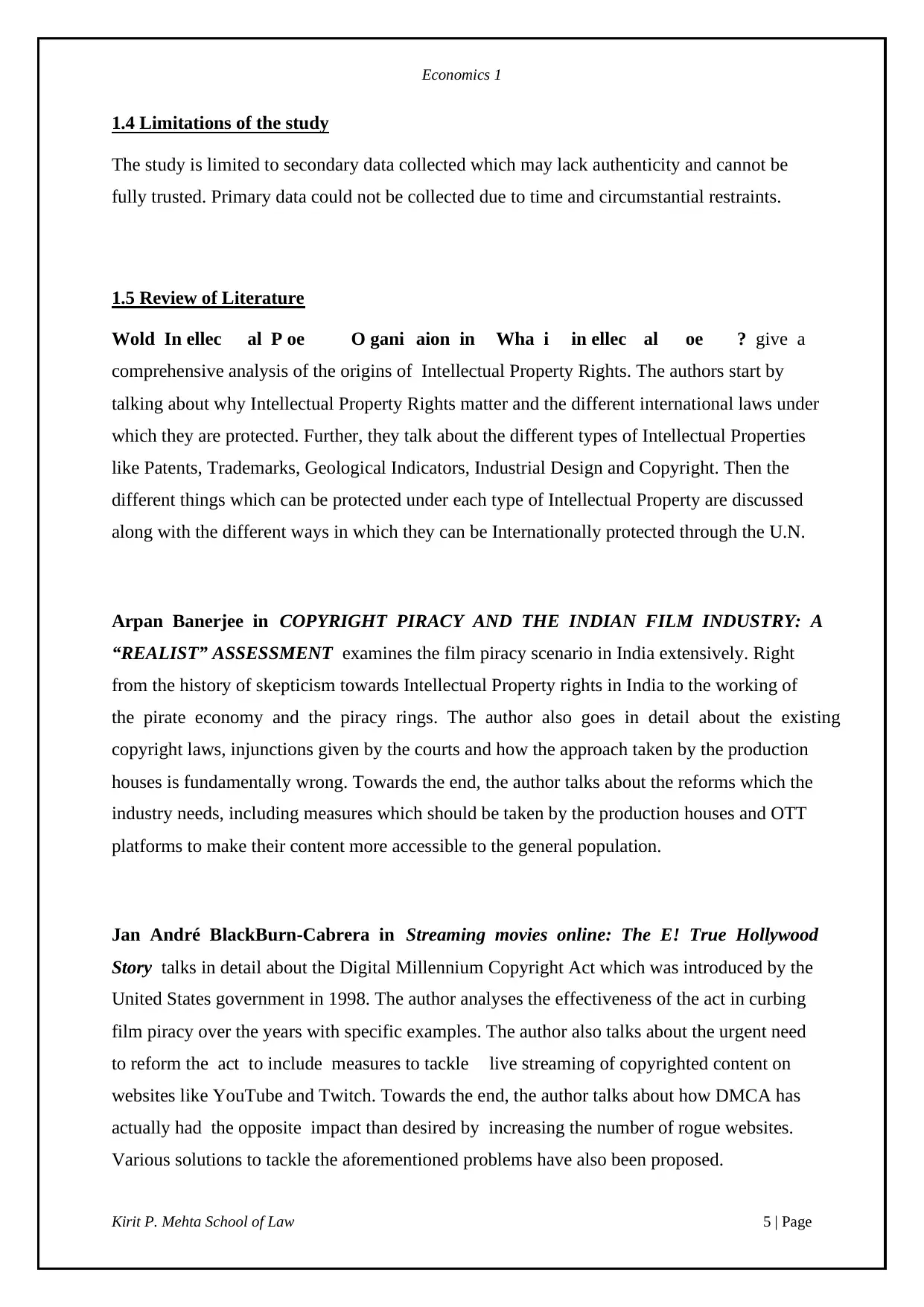
Economics 1
Kirit P. Mehta School of Law 5 | Page
1.4 Limitations of the study
The study is limited to secondary data collected which may lack authenticity and cannot be
fully trusted. Primary data could not be collected due to time and circumstantial restraints.
1.5 Review of Literature
Wold In ellec al P oe O gani aion in Wha i in ellec al oe ? give a
comprehensive analysis of the origins of Intellectual Property Rights. The authors start by
talking about why Intellectual Property Rights matter and the different international laws under
which they are protected. Further, they talk about the different types of Intellectual Properties
like Patents, Trademarks, Geological Indicators, Industrial Design and Copyright. Then the
different things which can be protected under each type of Intellectual Property are discussed
along with the different ways in which they can be Internationally protected through the U.N.
Arpan Banerjee in COPYRIGHT PIRACY AND THE INDIAN FILM INDUSTRY: A
“REALIST” ASSESSMENT examines the film piracy scenario in India extensively. Right
from the history of skepticism towards Intellectual Property rights in India to the working of
the pirate economy and the piracy rings. The author also goes in detail about the existing
copyright laws, injunctions given by the courts and how the approach taken by the production
houses is fundamentally wrong. Towards the end, the author talks about the reforms which the
industry needs, including measures which should be taken by the production houses and OTT
platforms to make their content more accessible to the general population.
Jan André BlackBurn-Cabrera in Streaming movies online: The E! True Hollywood
Story talks in detail about the Digital Millennium Copyright Act which was introduced by the
United States government in 1998. The author analyses the effectiveness of the act in curbing
film piracy over the years with specific examples. The author also talks about the urgent need
to reform the act to include measures to tackle live streaming of copyrighted content on
websites like YouTube and Twitch. Towards the end, the author talks about how DMCA has
actually had the opposite impact than desired by increasing the number of rogue websites.
Various solutions to tackle the aforementioned problems have also been proposed.
Kirit P. Mehta School of Law 5 | Page
1.4 Limitations of the study
The study is limited to secondary data collected which may lack authenticity and cannot be
fully trusted. Primary data could not be collected due to time and circumstantial restraints.
1.5 Review of Literature
Wold In ellec al P oe O gani aion in Wha i in ellec al oe ? give a
comprehensive analysis of the origins of Intellectual Property Rights. The authors start by
talking about why Intellectual Property Rights matter and the different international laws under
which they are protected. Further, they talk about the different types of Intellectual Properties
like Patents, Trademarks, Geological Indicators, Industrial Design and Copyright. Then the
different things which can be protected under each type of Intellectual Property are discussed
along with the different ways in which they can be Internationally protected through the U.N.
Arpan Banerjee in COPYRIGHT PIRACY AND THE INDIAN FILM INDUSTRY: A
“REALIST” ASSESSMENT examines the film piracy scenario in India extensively. Right
from the history of skepticism towards Intellectual Property rights in India to the working of
the pirate economy and the piracy rings. The author also goes in detail about the existing
copyright laws, injunctions given by the courts and how the approach taken by the production
houses is fundamentally wrong. Towards the end, the author talks about the reforms which the
industry needs, including measures which should be taken by the production houses and OTT
platforms to make their content more accessible to the general population.
Jan André BlackBurn-Cabrera in Streaming movies online: The E! True Hollywood
Story talks in detail about the Digital Millennium Copyright Act which was introduced by the
United States government in 1998. The author analyses the effectiveness of the act in curbing
film piracy over the years with specific examples. The author also talks about the urgent need
to reform the act to include measures to tackle live streaming of copyrighted content on
websites like YouTube and Twitch. Towards the end, the author talks about how DMCA has
actually had the opposite impact than desired by increasing the number of rogue websites.
Various solutions to tackle the aforementioned problems have also been proposed.
Paraphrase This Document
Need a fresh take? Get an instant paraphrase of this document with our AI Paraphraser
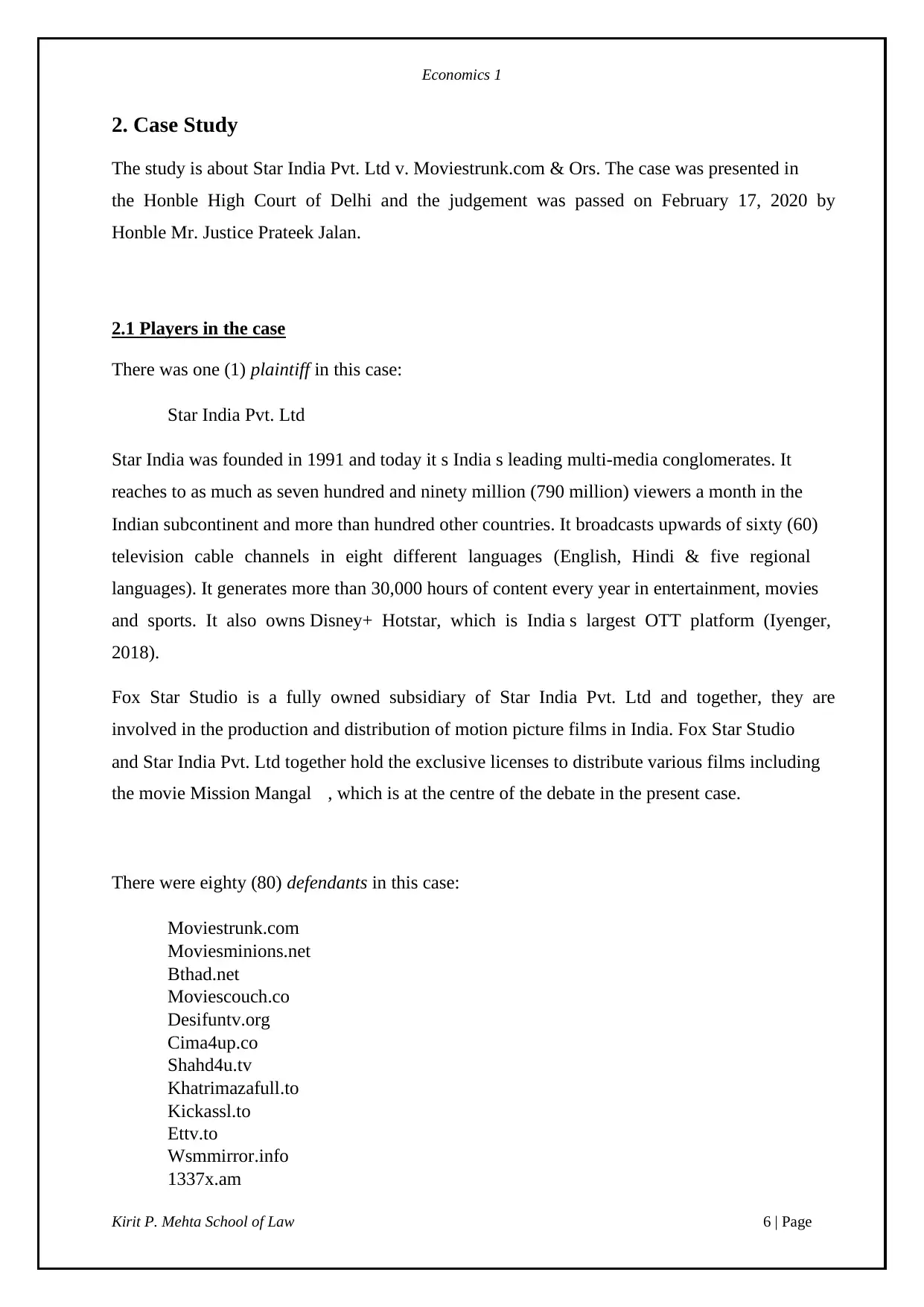
Economics 1
Kirit P. Mehta School of Law 6 | Page
2. Case Study
The study is about Star India Pvt. Ltd v. Moviestrunk.com & Ors. The case was presented in
the Honble High Court of Delhi and the judgement was passed on February 17, 2020 by
Honble Mr. Justice Prateek Jalan.
2.1 Players in the case
There was one (1) plaintiff in this case:
Star India Pvt. Ltd
Star India was founded in 1991 and today it s India s leading multi-media conglomerates. It
reaches to as much as seven hundred and ninety million (790 million) viewers a month in the
Indian subcontinent and more than hundred other countries. It broadcasts upwards of sixty (60)
television cable channels in eight different languages (English, Hindi & five regional
languages). It generates more than 30,000 hours of content every year in entertainment, movies
and sports. It also owns Disney+ Hotstar, which is India s largest OTT platform (Iyenger,
2018).
Fox Star Studio is a fully owned subsidiary of Star India Pvt. Ltd and together, they are
involved in the production and distribution of motion picture films in India. Fox Star Studio
and Star India Pvt. Ltd together hold the exclusive licenses to distribute various films including
the movie Mission Mangal , which is at the centre of the debate in the present case.
There were eighty (80) defendants in this case:
Moviestrunk.com
Moviesminions.net
Bthad.net
Moviescouch.co
Desifuntv.org
Cima4up.co
Shahd4u.tv
Khatrimazafull.to
Kickassl.to
Ettv.to
Wsmmirror.info
1337x.am
Kirit P. Mehta School of Law 6 | Page
2. Case Study
The study is about Star India Pvt. Ltd v. Moviestrunk.com & Ors. The case was presented in
the Honble High Court of Delhi and the judgement was passed on February 17, 2020 by
Honble Mr. Justice Prateek Jalan.
2.1 Players in the case
There was one (1) plaintiff in this case:
Star India Pvt. Ltd
Star India was founded in 1991 and today it s India s leading multi-media conglomerates. It
reaches to as much as seven hundred and ninety million (790 million) viewers a month in the
Indian subcontinent and more than hundred other countries. It broadcasts upwards of sixty (60)
television cable channels in eight different languages (English, Hindi & five regional
languages). It generates more than 30,000 hours of content every year in entertainment, movies
and sports. It also owns Disney+ Hotstar, which is India s largest OTT platform (Iyenger,
2018).
Fox Star Studio is a fully owned subsidiary of Star India Pvt. Ltd and together, they are
involved in the production and distribution of motion picture films in India. Fox Star Studio
and Star India Pvt. Ltd together hold the exclusive licenses to distribute various films including
the movie Mission Mangal , which is at the centre of the debate in the present case.
There were eighty (80) defendants in this case:
Moviestrunk.com
Moviesminions.net
Bthad.net
Moviescouch.co
Desifuntv.org
Cima4up.co
Shahd4u.tv
Khatrimazafull.to
Kickassl.to
Ettv.to
Wsmmirror.info
1337x.am
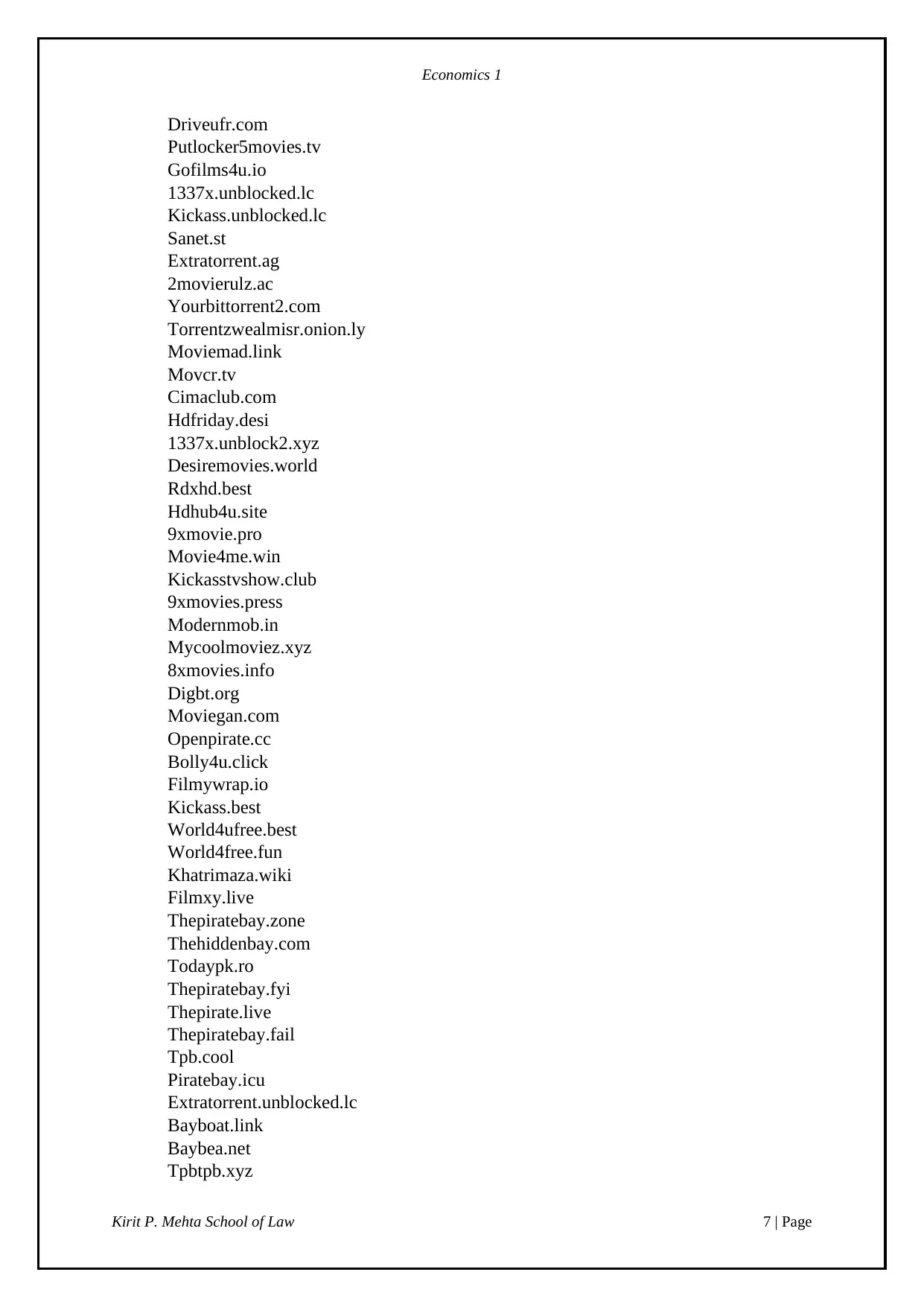
Economics 1
Kirit P. Mehta School of Law 7 | Page
Driveufr.com
Putlocker5movies.tv
Gofilms4u.io
1337x.unblocked.lc
Kickass.unblocked.lc
Sanet.st
Extratorrent.ag
2movierulz.ac
Yourbittorrent2.com
Torrentzwealmisr.onion.ly
Moviemad.link
Movcr.tv
Cimaclub.com
Hdfriday.desi
1337x.unblock2.xyz
Desiremovies.world
Rdxhd.best
Hdhub4u.site
9xmovie.pro
Movie4me.win
Kickasstvshow.club
9xmovies.press
Modernmob.in
Mycoolmoviez.xyz
8xmovies.info
Digbt.org
Moviegan.com
Openpirate.cc
Bolly4u.click
Filmywrap.io
Kickass.best
World4ufree.best
World4free.fun
Khatrimaza.wiki
Filmxy.live
Thepiratebay.zone
Thehiddenbay.com
Todaypk.ro
Thepiratebay.fyi
Thepirate.live
Thepiratebay.fail
Tpb.cool
Piratebay.icu
Extratorrent.unblocked.lc
Bayboat.link
Baybea.net
Tpbtpb.xyz
Kirit P. Mehta School of Law 7 | Page
Driveufr.com
Putlocker5movies.tv
Gofilms4u.io
1337x.unblocked.lc
Kickass.unblocked.lc
Sanet.st
Extratorrent.ag
2movierulz.ac
Yourbittorrent2.com
Torrentzwealmisr.onion.ly
Moviemad.link
Movcr.tv
Cimaclub.com
Hdfriday.desi
1337x.unblock2.xyz
Desiremovies.world
Rdxhd.best
Hdhub4u.site
9xmovie.pro
Movie4me.win
Kickasstvshow.club
9xmovies.press
Modernmob.in
Mycoolmoviez.xyz
8xmovies.info
Digbt.org
Moviegan.com
Openpirate.cc
Bolly4u.click
Filmywrap.io
Kickass.best
World4ufree.best
World4free.fun
Khatrimaza.wiki
Filmxy.live
Thepiratebay.zone
Thehiddenbay.com
Todaypk.ro
Thepiratebay.fyi
Thepirate.live
Thepiratebay.fail
Tpb.cool
Piratebay.icu
Extratorrent.unblocked.lc
Bayboat.link
Baybea.net
Tpbtpb.xyz
⊘ This is a preview!⊘
Do you want full access?
Subscribe today to unlock all pages.

Trusted by 1+ million students worldwide
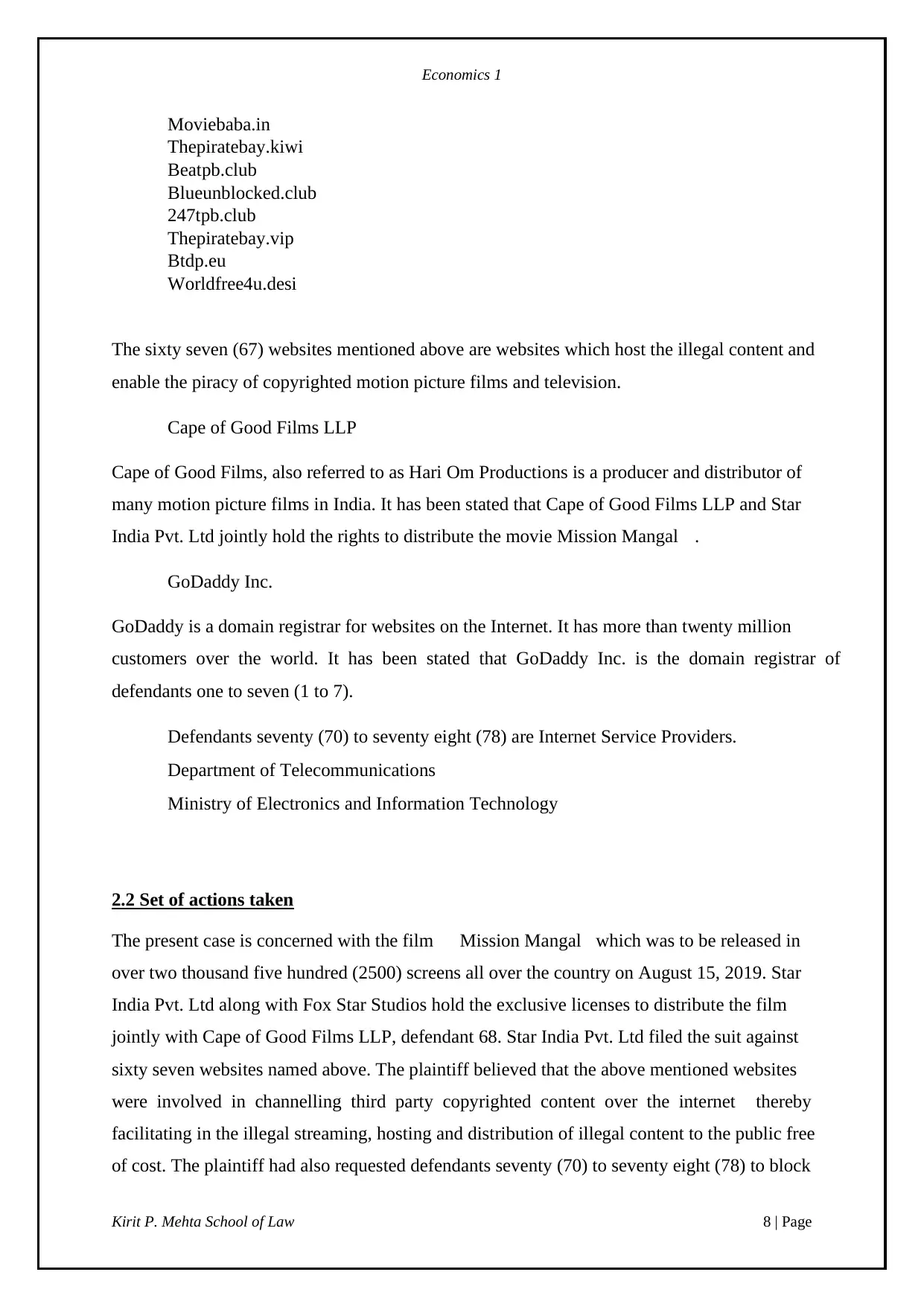
Economics 1
Kirit P. Mehta School of Law 8 | Page
Moviebaba.in
Thepiratebay.kiwi
Beatpb.club
Blueunblocked.club
247tpb.club
Thepiratebay.vip
Btdp.eu
Worldfree4u.desi
The sixty seven (67) websites mentioned above are websites which host the illegal content and
enable the piracy of copyrighted motion picture films and television.
Cape of Good Films LLP
Cape of Good Films, also referred to as Hari Om Productions is a producer and distributor of
many motion picture films in India. It has been stated that Cape of Good Films LLP and Star
India Pvt. Ltd jointly hold the rights to distribute the movie Mission Mangal .
GoDaddy Inc.
GoDaddy is a domain registrar for websites on the Internet. It has more than twenty million
customers over the world. It has been stated that GoDaddy Inc. is the domain registrar of
defendants one to seven (1 to 7).
Defendants seventy (70) to seventy eight (78) are Internet Service Providers.
Department of Telecommunications
Ministry of Electronics and Information Technology
2.2 Set of actions taken
The present case is concerned with the film Mission Mangal which was to be released in
over two thousand five hundred (2500) screens all over the country on August 15, 2019. Star
India Pvt. Ltd along with Fox Star Studios hold the exclusive licenses to distribute the film
jointly with Cape of Good Films LLP, defendant 68. Star India Pvt. Ltd filed the suit against
sixty seven websites named above. The plaintiff believed that the above mentioned websites
were involved in channelling third party copyrighted content over the internet thereby
facilitating in the illegal streaming, hosting and distribution of illegal content to the public free
of cost. The plaintiff had also requested defendants seventy (70) to seventy eight (78) to block
Kirit P. Mehta School of Law 8 | Page
Moviebaba.in
Thepiratebay.kiwi
Beatpb.club
Blueunblocked.club
247tpb.club
Thepiratebay.vip
Btdp.eu
Worldfree4u.desi
The sixty seven (67) websites mentioned above are websites which host the illegal content and
enable the piracy of copyrighted motion picture films and television.
Cape of Good Films LLP
Cape of Good Films, also referred to as Hari Om Productions is a producer and distributor of
many motion picture films in India. It has been stated that Cape of Good Films LLP and Star
India Pvt. Ltd jointly hold the rights to distribute the movie Mission Mangal .
GoDaddy Inc.
GoDaddy is a domain registrar for websites on the Internet. It has more than twenty million
customers over the world. It has been stated that GoDaddy Inc. is the domain registrar of
defendants one to seven (1 to 7).
Defendants seventy (70) to seventy eight (78) are Internet Service Providers.
Department of Telecommunications
Ministry of Electronics and Information Technology
2.2 Set of actions taken
The present case is concerned with the film Mission Mangal which was to be released in
over two thousand five hundred (2500) screens all over the country on August 15, 2019. Star
India Pvt. Ltd along with Fox Star Studios hold the exclusive licenses to distribute the film
jointly with Cape of Good Films LLP, defendant 68. Star India Pvt. Ltd filed the suit against
sixty seven websites named above. The plaintiff believed that the above mentioned websites
were involved in channelling third party copyrighted content over the internet thereby
facilitating in the illegal streaming, hosting and distribution of illegal content to the public free
of cost. The plaintiff had also requested defendants seventy (70) to seventy eight (78) to block
Paraphrase This Document
Need a fresh take? Get an instant paraphrase of this document with our AI Paraphraser
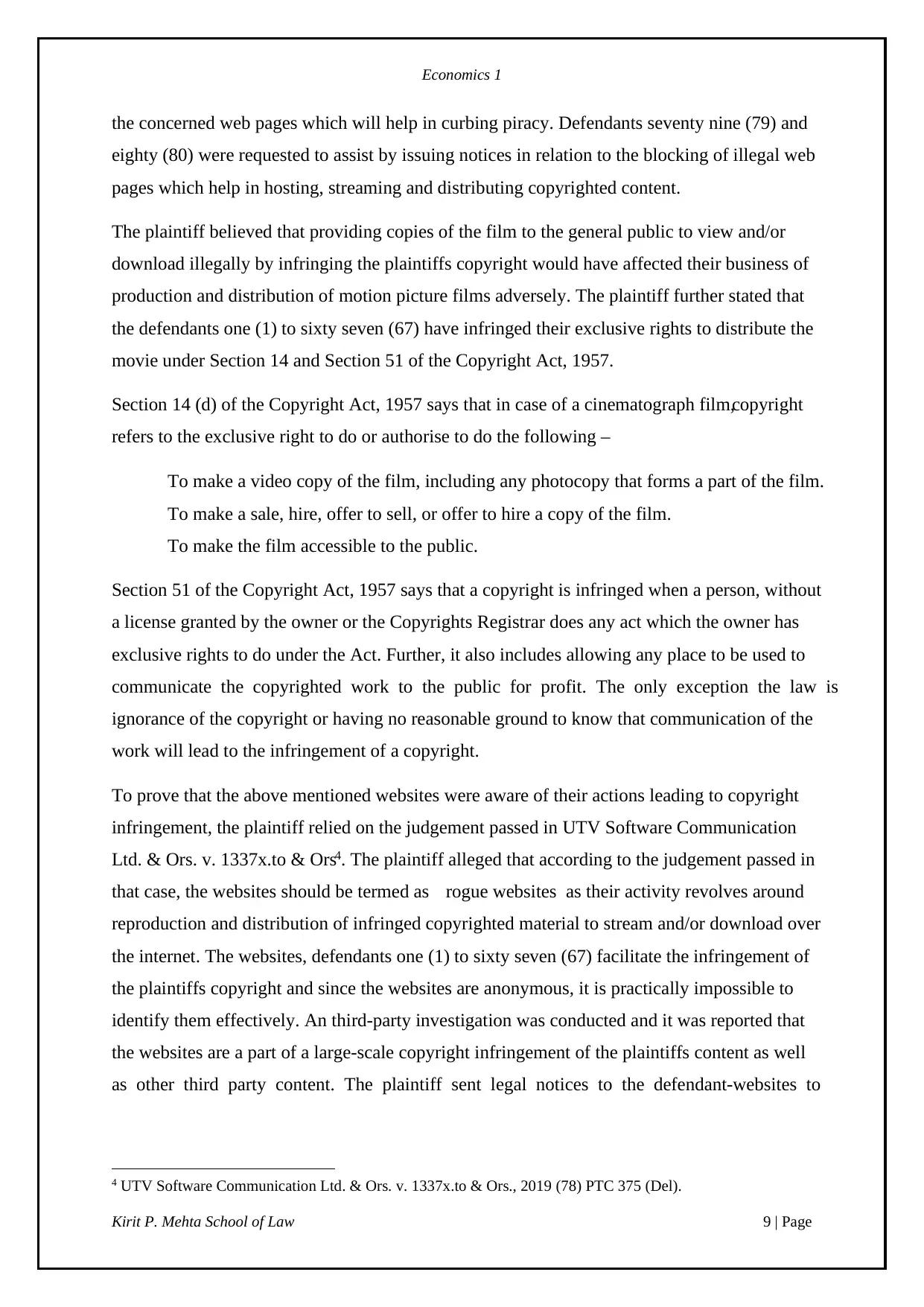
Economics 1
Kirit P. Mehta School of Law 9 | Page
the concerned web pages which will help in curbing piracy. Defendants seventy nine (79) and
eighty (80) were requested to assist by issuing notices in relation to the blocking of illegal web
pages which help in hosting, streaming and distributing copyrighted content.
The plaintiff believed that providing copies of the film to the general public to view and/or
download illegally by infringing the plaintiffs copyright would have affected their business of
production and distribution of motion picture films adversely. The plaintiff further stated that
the defendants one (1) to sixty seven (67) have infringed their exclusive rights to distribute the
movie under Section 14 and Section 51 of the Copyright Act, 1957.
Section 14 (d) of the Copyright Act, 1957 says that in case of a cinematograph film,copyright
refers to the exclusive right to do or authorise to do the following –
To make a video copy of the film, including any photocopy that forms a part of the film.
To make a sale, hire, offer to sell, or offer to hire a copy of the film.
To make the film accessible to the public.
Section 51 of the Copyright Act, 1957 says that a copyright is infringed when a person, without
a license granted by the owner or the Copyrights Registrar does any act which the owner has
exclusive rights to do under the Act. Further, it also includes allowing any place to be used to
communicate the copyrighted work to the public for profit. The only exception the law is
ignorance of the copyright or having no reasonable ground to know that communication of the
work will lead to the infringement of a copyright.
To prove that the above mentioned websites were aware of their actions leading to copyright
infringement, the plaintiff relied on the judgement passed in UTV Software Communication
Ltd. & Ors. v. 1337x.to & Ors4. The plaintiff alleged that according to the judgement passed in
that case, the websites should be termed as rogue websites as their activity revolves around
reproduction and distribution of infringed copyrighted material to stream and/or download over
the internet. The websites, defendants one (1) to sixty seven (67) facilitate the infringement of
the plaintiffs copyright and since the websites are anonymous, it is practically impossible to
identify them effectively. An third-party investigation was conducted and it was reported that
the websites are a part of a large-scale copyright infringement of the plaintiffs content as well
as other third party content. The plaintiff sent legal notices to the defendant-websites to
4 UTV Software Communication Ltd. & Ors. v. 1337x.to & Ors., 2019 (78) PTC 375 (Del).
Kirit P. Mehta School of Law 9 | Page
the concerned web pages which will help in curbing piracy. Defendants seventy nine (79) and
eighty (80) were requested to assist by issuing notices in relation to the blocking of illegal web
pages which help in hosting, streaming and distributing copyrighted content.
The plaintiff believed that providing copies of the film to the general public to view and/or
download illegally by infringing the plaintiffs copyright would have affected their business of
production and distribution of motion picture films adversely. The plaintiff further stated that
the defendants one (1) to sixty seven (67) have infringed their exclusive rights to distribute the
movie under Section 14 and Section 51 of the Copyright Act, 1957.
Section 14 (d) of the Copyright Act, 1957 says that in case of a cinematograph film,copyright
refers to the exclusive right to do or authorise to do the following –
To make a video copy of the film, including any photocopy that forms a part of the film.
To make a sale, hire, offer to sell, or offer to hire a copy of the film.
To make the film accessible to the public.
Section 51 of the Copyright Act, 1957 says that a copyright is infringed when a person, without
a license granted by the owner or the Copyrights Registrar does any act which the owner has
exclusive rights to do under the Act. Further, it also includes allowing any place to be used to
communicate the copyrighted work to the public for profit. The only exception the law is
ignorance of the copyright or having no reasonable ground to know that communication of the
work will lead to the infringement of a copyright.
To prove that the above mentioned websites were aware of their actions leading to copyright
infringement, the plaintiff relied on the judgement passed in UTV Software Communication
Ltd. & Ors. v. 1337x.to & Ors4. The plaintiff alleged that according to the judgement passed in
that case, the websites should be termed as rogue websites as their activity revolves around
reproduction and distribution of infringed copyrighted material to stream and/or download over
the internet. The websites, defendants one (1) to sixty seven (67) facilitate the infringement of
the plaintiffs copyright and since the websites are anonymous, it is practically impossible to
identify them effectively. An third-party investigation was conducted and it was reported that
the websites are a part of a large-scale copyright infringement of the plaintiffs content as well
as other third party content. The plaintiff sent legal notices to the defendant-websites to
4 UTV Software Communication Ltd. & Ors. v. 1337x.to & Ors., 2019 (78) PTC 375 (Del).
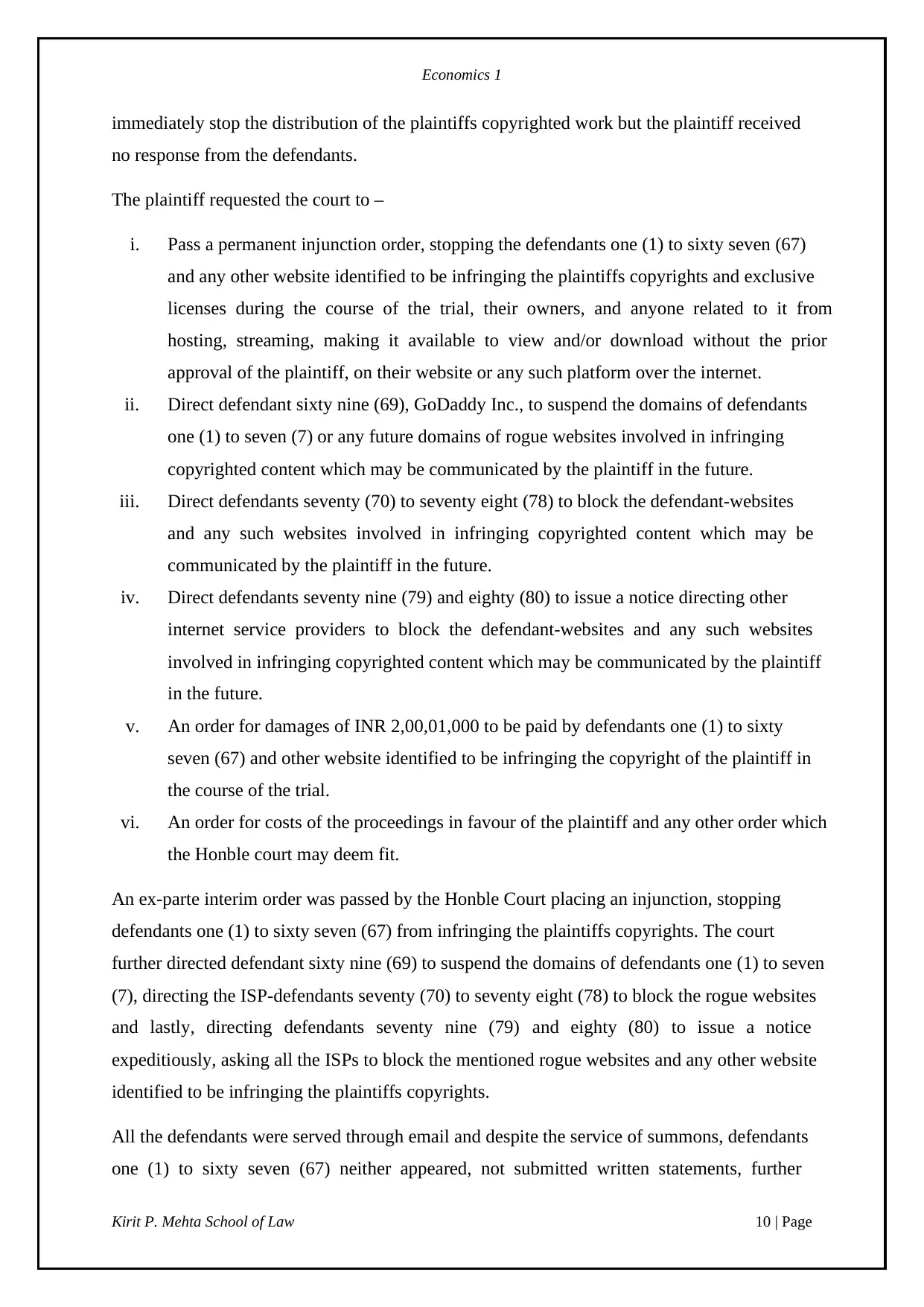
Economics 1
Kirit P. Mehta School of Law 10 | Page
immediately stop the distribution of the plaintiffs copyrighted work but the plaintiff received
no response from the defendants.
The plaintiff requested the court to –
i. Pass a permanent injunction order, stopping the defendants one (1) to sixty seven (67)
and any other website identified to be infringing the plaintiffs copyrights and exclusive
licenses during the course of the trial, their owners, and anyone related to it from
hosting, streaming, making it available to view and/or download without the prior
approval of the plaintiff, on their website or any such platform over the internet.
ii. Direct defendant sixty nine (69), GoDaddy Inc., to suspend the domains of defendants
one (1) to seven (7) or any future domains of rogue websites involved in infringing
copyrighted content which may be communicated by the plaintiff in the future.
iii. Direct defendants seventy (70) to seventy eight (78) to block the defendant-websites
and any such websites involved in infringing copyrighted content which may be
communicated by the plaintiff in the future.
iv. Direct defendants seventy nine (79) and eighty (80) to issue a notice directing other
internet service providers to block the defendant-websites and any such websites
involved in infringing copyrighted content which may be communicated by the plaintiff
in the future.
v. An order for damages of INR 2,00,01,000 to be paid by defendants one (1) to sixty
seven (67) and other website identified to be infringing the copyright of the plaintiff in
the course of the trial.
vi. An order for costs of the proceedings in favour of the plaintiff and any other order which
the Honble court may deem fit.
An ex-parte interim order was passed by the Honble Court placing an injunction, stopping
defendants one (1) to sixty seven (67) from infringing the plaintiffs copyrights. The court
further directed defendant sixty nine (69) to suspend the domains of defendants one (1) to seven
(7), directing the ISP-defendants seventy (70) to seventy eight (78) to block the rogue websites
and lastly, directing defendants seventy nine (79) and eighty (80) to issue a notice
expeditiously, asking all the ISPs to block the mentioned rogue websites and any other website
identified to be infringing the plaintiffs copyrights.
All the defendants were served through email and despite the service of summons, defendants
one (1) to sixty seven (67) neither appeared, not submitted written statements, further
Kirit P. Mehta School of Law 10 | Page
immediately stop the distribution of the plaintiffs copyrighted work but the plaintiff received
no response from the defendants.
The plaintiff requested the court to –
i. Pass a permanent injunction order, stopping the defendants one (1) to sixty seven (67)
and any other website identified to be infringing the plaintiffs copyrights and exclusive
licenses during the course of the trial, their owners, and anyone related to it from
hosting, streaming, making it available to view and/or download without the prior
approval of the plaintiff, on their website or any such platform over the internet.
ii. Direct defendant sixty nine (69), GoDaddy Inc., to suspend the domains of defendants
one (1) to seven (7) or any future domains of rogue websites involved in infringing
copyrighted content which may be communicated by the plaintiff in the future.
iii. Direct defendants seventy (70) to seventy eight (78) to block the defendant-websites
and any such websites involved in infringing copyrighted content which may be
communicated by the plaintiff in the future.
iv. Direct defendants seventy nine (79) and eighty (80) to issue a notice directing other
internet service providers to block the defendant-websites and any such websites
involved in infringing copyrighted content which may be communicated by the plaintiff
in the future.
v. An order for damages of INR 2,00,01,000 to be paid by defendants one (1) to sixty
seven (67) and other website identified to be infringing the copyright of the plaintiff in
the course of the trial.
vi. An order for costs of the proceedings in favour of the plaintiff and any other order which
the Honble court may deem fit.
An ex-parte interim order was passed by the Honble Court placing an injunction, stopping
defendants one (1) to sixty seven (67) from infringing the plaintiffs copyrights. The court
further directed defendant sixty nine (69) to suspend the domains of defendants one (1) to seven
(7), directing the ISP-defendants seventy (70) to seventy eight (78) to block the rogue websites
and lastly, directing defendants seventy nine (79) and eighty (80) to issue a notice
expeditiously, asking all the ISPs to block the mentioned rogue websites and any other website
identified to be infringing the plaintiffs copyrights.
All the defendants were served through email and despite the service of summons, defendants
one (1) to sixty seven (67) neither appeared, not submitted written statements, further
⊘ This is a preview!⊘
Do you want full access?
Subscribe today to unlock all pages.

Trusted by 1+ million students worldwide
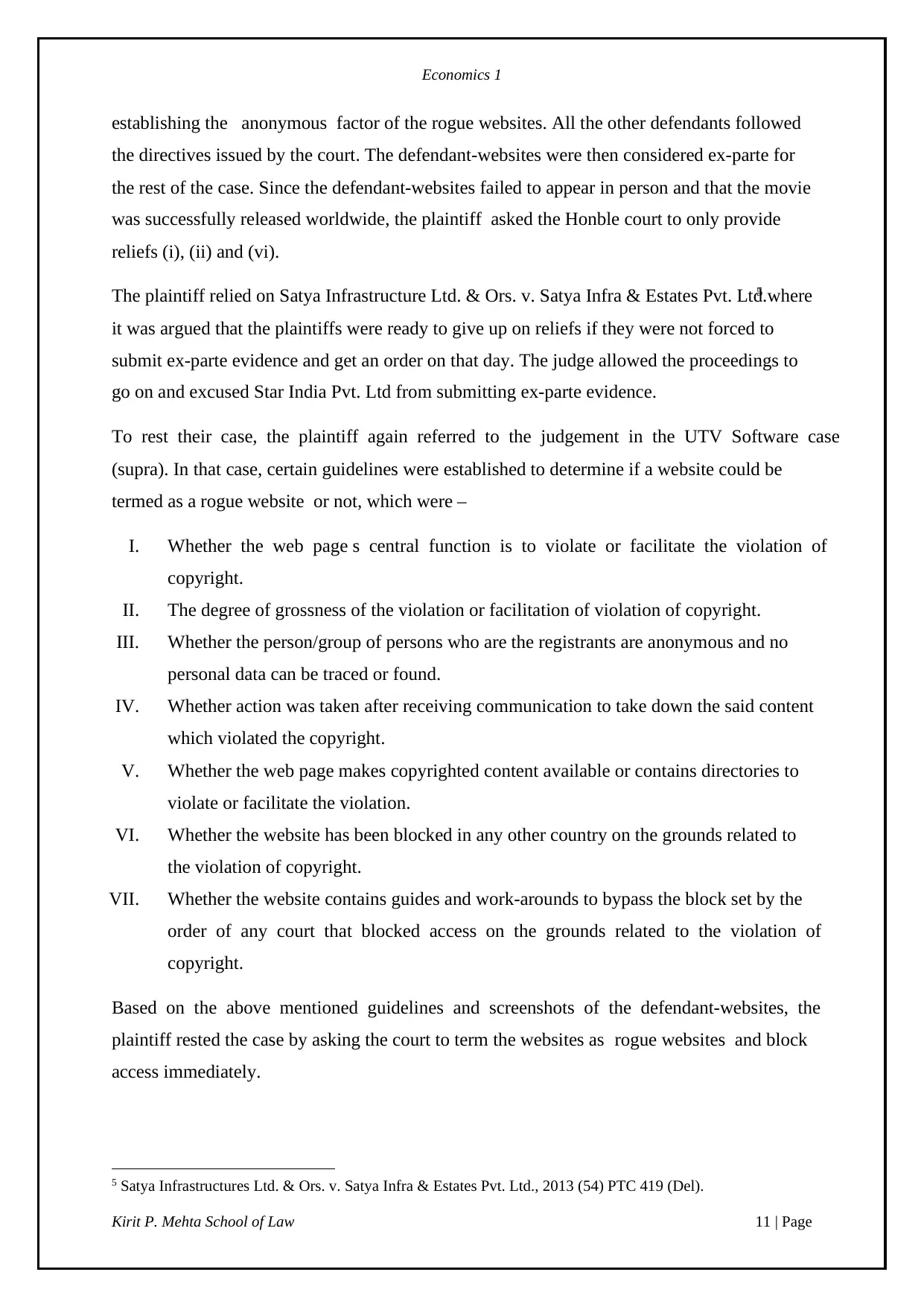
Economics 1
Kirit P. Mehta School of Law 11 | Page
establishing the anonymous factor of the rogue websites. All the other defendants followed
the directives issued by the court. The defendant-websites were then considered ex-parte for
the rest of the case. Since the defendant-websites failed to appear in person and that the movie
was successfully released worldwide, the plaintiff asked the Honble court to only provide
reliefs (i), (ii) and (vi).
The plaintiff relied on Satya Infrastructure Ltd. & Ors. v. Satya Infra & Estates Pvt. Ltd.5 where
it was argued that the plaintiffs were ready to give up on reliefs if they were not forced to
submit ex-parte evidence and get an order on that day. The judge allowed the proceedings to
go on and excused Star India Pvt. Ltd from submitting ex-parte evidence.
To rest their case, the plaintiff again referred to the judgement in the UTV Software case
(supra). In that case, certain guidelines were established to determine if a website could be
termed as a rogue website or not, which were –
I. Whether the web page s central function is to violate or facilitate the violation of
copyright.
II. The degree of grossness of the violation or facilitation of violation of copyright.
III. Whether the person/group of persons who are the registrants are anonymous and no
personal data can be traced or found.
IV. Whether action was taken after receiving communication to take down the said content
which violated the copyright.
V. Whether the web page makes copyrighted content available or contains directories to
violate or facilitate the violation.
VI. Whether the website has been blocked in any other country on the grounds related to
the violation of copyright.
VII. Whether the website contains guides and work-arounds to bypass the block set by the
order of any court that blocked access on the grounds related to the violation of
copyright.
Based on the above mentioned guidelines and screenshots of the defendant-websites, the
plaintiff rested the case by asking the court to term the websites as rogue websites and block
access immediately.
5 Satya Infrastructures Ltd. & Ors. v. Satya Infra & Estates Pvt. Ltd., 2013 (54) PTC 419 (Del).
Kirit P. Mehta School of Law 11 | Page
establishing the anonymous factor of the rogue websites. All the other defendants followed
the directives issued by the court. The defendant-websites were then considered ex-parte for
the rest of the case. Since the defendant-websites failed to appear in person and that the movie
was successfully released worldwide, the plaintiff asked the Honble court to only provide
reliefs (i), (ii) and (vi).
The plaintiff relied on Satya Infrastructure Ltd. & Ors. v. Satya Infra & Estates Pvt. Ltd.5 where
it was argued that the plaintiffs were ready to give up on reliefs if they were not forced to
submit ex-parte evidence and get an order on that day. The judge allowed the proceedings to
go on and excused Star India Pvt. Ltd from submitting ex-parte evidence.
To rest their case, the plaintiff again referred to the judgement in the UTV Software case
(supra). In that case, certain guidelines were established to determine if a website could be
termed as a rogue website or not, which were –
I. Whether the web page s central function is to violate or facilitate the violation of
copyright.
II. The degree of grossness of the violation or facilitation of violation of copyright.
III. Whether the person/group of persons who are the registrants are anonymous and no
personal data can be traced or found.
IV. Whether action was taken after receiving communication to take down the said content
which violated the copyright.
V. Whether the web page makes copyrighted content available or contains directories to
violate or facilitate the violation.
VI. Whether the website has been blocked in any other country on the grounds related to
the violation of copyright.
VII. Whether the website contains guides and work-arounds to bypass the block set by the
order of any court that blocked access on the grounds related to the violation of
copyright.
Based on the above mentioned guidelines and screenshots of the defendant-websites, the
plaintiff rested the case by asking the court to term the websites as rogue websites and block
access immediately.
5 Satya Infrastructures Ltd. & Ors. v. Satya Infra & Estates Pvt. Ltd., 2013 (54) PTC 419 (Del).
Paraphrase This Document
Need a fresh take? Get an instant paraphrase of this document with our AI Paraphraser
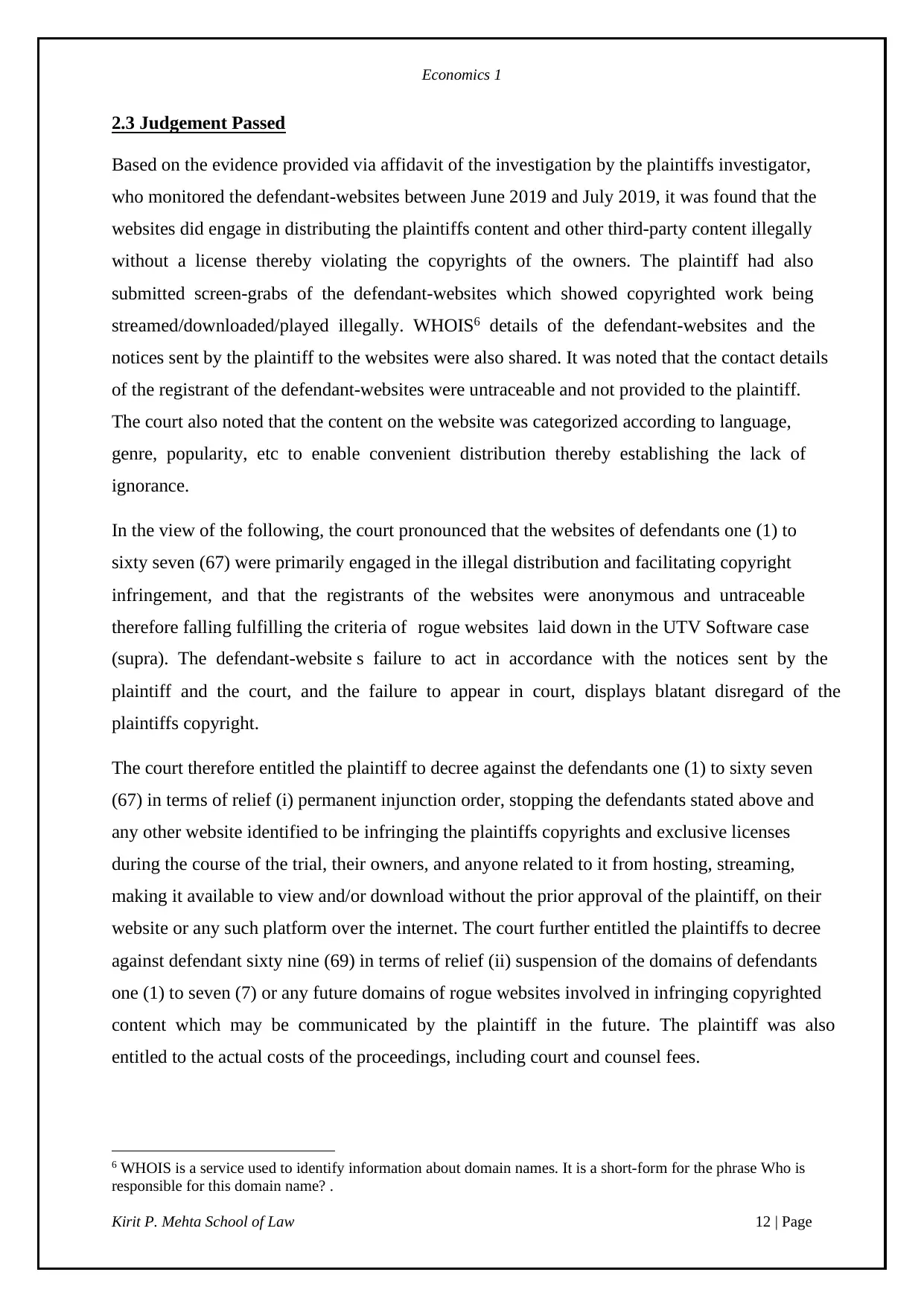
Economics 1
Kirit P. Mehta School of Law 12 | Page
2.3 Judgement Passed
Based on the evidence provided via affidavit of the investigation by the plaintiffs investigator,
who monitored the defendant-websites between June 2019 and July 2019, it was found that the
websites did engage in distributing the plaintiffs content and other third-party content illegally
without a license thereby violating the copyrights of the owners. The plaintiff had also
submitted screen-grabs of the defendant-websites which showed copyrighted work being
streamed/downloaded/played illegally. WHOIS6 details of the defendant-websites and the
notices sent by the plaintiff to the websites were also shared. It was noted that the contact details
of the registrant of the defendant-websites were untraceable and not provided to the plaintiff.
The court also noted that the content on the website was categorized according to language,
genre, popularity, etc to enable convenient distribution thereby establishing the lack of
ignorance.
In the view of the following, the court pronounced that the websites of defendants one (1) to
sixty seven (67) were primarily engaged in the illegal distribution and facilitating copyright
infringement, and that the registrants of the websites were anonymous and untraceable
therefore falling fulfilling the criteria of rogue websites laid down in the UTV Software case
(supra). The defendant-website s failure to act in accordance with the notices sent by the
plaintiff and the court, and the failure to appear in court, displays blatant disregard of the
plaintiffs copyright.
The court therefore entitled the plaintiff to decree against the defendants one (1) to sixty seven
(67) in terms of relief (i) permanent injunction order, stopping the defendants stated above and
any other website identified to be infringing the plaintiffs copyrights and exclusive licenses
during the course of the trial, their owners, and anyone related to it from hosting, streaming,
making it available to view and/or download without the prior approval of the plaintiff, on their
website or any such platform over the internet. The court further entitled the plaintiffs to decree
against defendant sixty nine (69) in terms of relief (ii) suspension of the domains of defendants
one (1) to seven (7) or any future domains of rogue websites involved in infringing copyrighted
content which may be communicated by the plaintiff in the future. The plaintiff was also
entitled to the actual costs of the proceedings, including court and counsel fees.
6 WHOIS is a service used to identify information about domain names. It is a short-form for the phrase Who is
responsible for this domain name? .
Kirit P. Mehta School of Law 12 | Page
2.3 Judgement Passed
Based on the evidence provided via affidavit of the investigation by the plaintiffs investigator,
who monitored the defendant-websites between June 2019 and July 2019, it was found that the
websites did engage in distributing the plaintiffs content and other third-party content illegally
without a license thereby violating the copyrights of the owners. The plaintiff had also
submitted screen-grabs of the defendant-websites which showed copyrighted work being
streamed/downloaded/played illegally. WHOIS6 details of the defendant-websites and the
notices sent by the plaintiff to the websites were also shared. It was noted that the contact details
of the registrant of the defendant-websites were untraceable and not provided to the plaintiff.
The court also noted that the content on the website was categorized according to language,
genre, popularity, etc to enable convenient distribution thereby establishing the lack of
ignorance.
In the view of the following, the court pronounced that the websites of defendants one (1) to
sixty seven (67) were primarily engaged in the illegal distribution and facilitating copyright
infringement, and that the registrants of the websites were anonymous and untraceable
therefore falling fulfilling the criteria of rogue websites laid down in the UTV Software case
(supra). The defendant-website s failure to act in accordance with the notices sent by the
plaintiff and the court, and the failure to appear in court, displays blatant disregard of the
plaintiffs copyright.
The court therefore entitled the plaintiff to decree against the defendants one (1) to sixty seven
(67) in terms of relief (i) permanent injunction order, stopping the defendants stated above and
any other website identified to be infringing the plaintiffs copyrights and exclusive licenses
during the course of the trial, their owners, and anyone related to it from hosting, streaming,
making it available to view and/or download without the prior approval of the plaintiff, on their
website or any such platform over the internet. The court further entitled the plaintiffs to decree
against defendant sixty nine (69) in terms of relief (ii) suspension of the domains of defendants
one (1) to seven (7) or any future domains of rogue websites involved in infringing copyrighted
content which may be communicated by the plaintiff in the future. The plaintiff was also
entitled to the actual costs of the proceedings, including court and counsel fees.
6 WHOIS is a service used to identify information about domain names. It is a short-form for the phrase Who is
responsible for this domain name? .
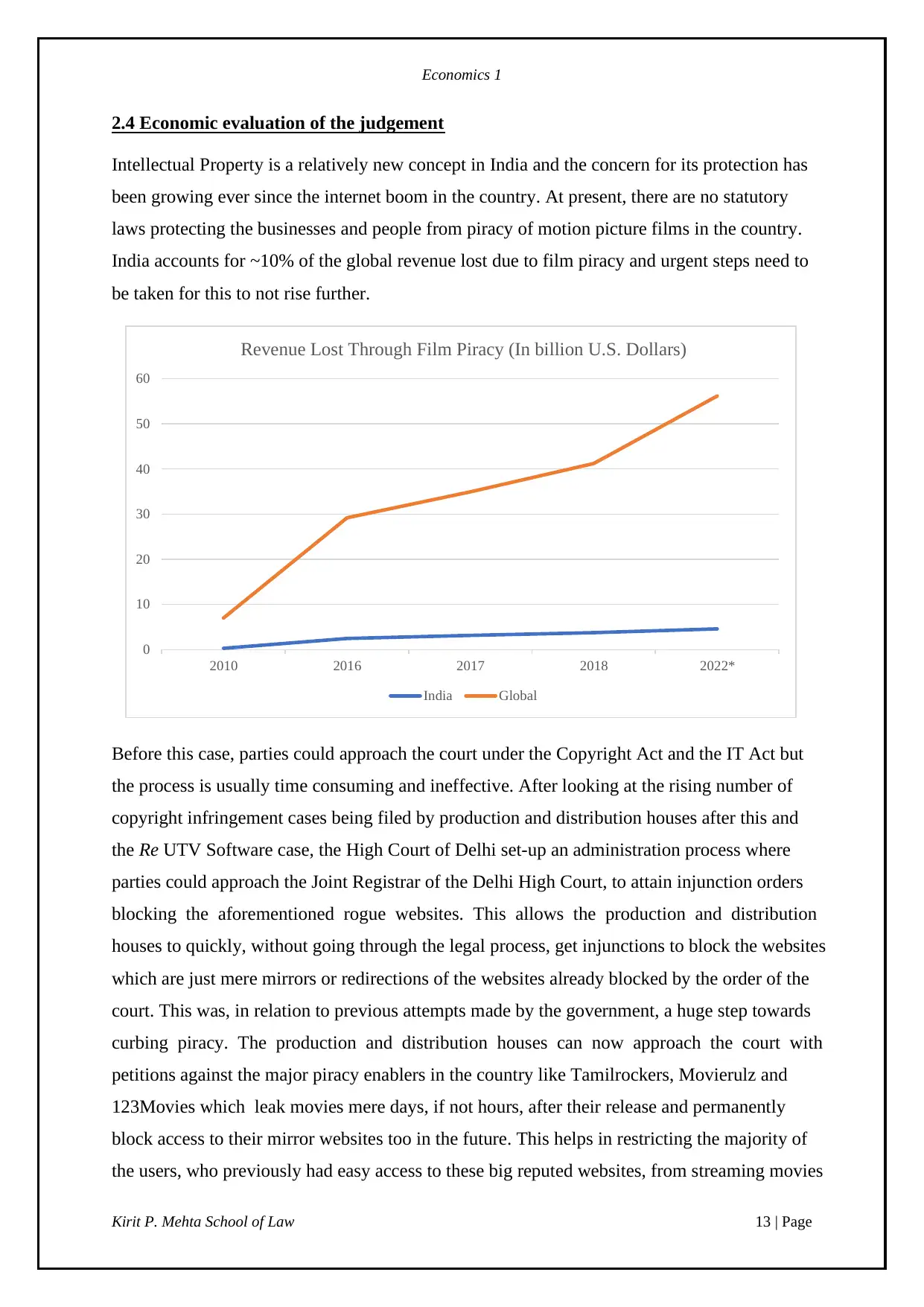
Economics 1
Kirit P. Mehta School of Law 13 | Page
2.4 Economic evaluation of the judgement
Intellectual Property is a relatively new concept in India and the concern for its protection has
been growing ever since the internet boom in the country. At present, there are no statutory
laws protecting the businesses and people from piracy of motion picture films in the country.
India accounts for ~10% of the global revenue lost due to film piracy and urgent steps need to
be taken for this to not rise further.
Before this case, parties could approach the court under the Copyright Act and the IT Act but
the process is usually time consuming and ineffective. After looking at the rising number of
copyright infringement cases being filed by production and distribution houses after this and
the Re UTV Software case, the High Court of Delhi set-up an administration process where
parties could approach the Joint Registrar of the Delhi High Court, to attain injunction orders
blocking the aforementioned rogue websites. This allows the production and distribution
houses to quickly, without going through the legal process, get injunctions to block the websites
which are just mere mirrors or redirections of the websites already blocked by the order of the
court. This was, in relation to previous attempts made by the government, a huge step towards
curbing piracy. The production and distribution houses can now approach the court with
petitions against the major piracy enablers in the country like Tamilrockers, Movierulz and
123Movies which leak movies mere days, if not hours, after their release and permanently
block access to their mirror websites too in the future. This helps in restricting the majority of
the users, who previously had easy access to these big reputed websites, from streaming movies
0
10
20
30
40
50
60
2010 2016 2017 2018 2022*
Revenue Lost Through Film Piracy (In billion U.S. Dollars)
India Global
Kirit P. Mehta School of Law 13 | Page
2.4 Economic evaluation of the judgement
Intellectual Property is a relatively new concept in India and the concern for its protection has
been growing ever since the internet boom in the country. At present, there are no statutory
laws protecting the businesses and people from piracy of motion picture films in the country.
India accounts for ~10% of the global revenue lost due to film piracy and urgent steps need to
be taken for this to not rise further.
Before this case, parties could approach the court under the Copyright Act and the IT Act but
the process is usually time consuming and ineffective. After looking at the rising number of
copyright infringement cases being filed by production and distribution houses after this and
the Re UTV Software case, the High Court of Delhi set-up an administration process where
parties could approach the Joint Registrar of the Delhi High Court, to attain injunction orders
blocking the aforementioned rogue websites. This allows the production and distribution
houses to quickly, without going through the legal process, get injunctions to block the websites
which are just mere mirrors or redirections of the websites already blocked by the order of the
court. This was, in relation to previous attempts made by the government, a huge step towards
curbing piracy. The production and distribution houses can now approach the court with
petitions against the major piracy enablers in the country like Tamilrockers, Movierulz and
123Movies which leak movies mere days, if not hours, after their release and permanently
block access to their mirror websites too in the future. This helps in restricting the majority of
the users, who previously had easy access to these big reputed websites, from streaming movies
0
10
20
30
40
50
60
2010 2016 2017 2018 2022*
Revenue Lost Through Film Piracy (In billion U.S. Dollars)
India Global
⊘ This is a preview!⊘
Do you want full access?
Subscribe today to unlock all pages.

Trusted by 1+ million students worldwide
1 out of 15
Related Documents
Your All-in-One AI-Powered Toolkit for Academic Success.
+13062052269
info@desklib.com
Available 24*7 on WhatsApp / Email
![[object Object]](/_next/static/media/star-bottom.7253800d.svg)
Unlock your academic potential
Copyright © 2020–2026 A2Z Services. All Rights Reserved. Developed and managed by ZUCOL.




